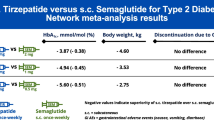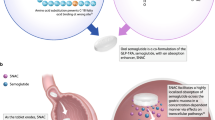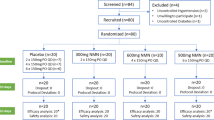Abstract
Purpose
Despite the lack of evidence, a growing number of people are using herbal medicine to attenuate the burden of diabetes. There is an urgent need to investigate the clinical potential of herbs. Preliminary observations suggest that American ginseng (Panax quinquefolius [AG]) may reduce postprandial glycemia. Thus, we aimed to evaluate the efficacy and safety of AG as an add-on therapy in individuals with type 2 diabetes (T2DM) controlled by conventional treatment.
Methods
24 individuals living with T2DM completed the study (F:M = 11:13; age = 64 ± 7 year; BMI = 27.8 ± 4.6 kg/m2; HbA1c = 7.1 ± 1.2%). Utilizing a double-blind, cross-over design, the participants were randomized to receive either 1 g/meal (3 g/day) of AG extract or placebo for 8 weeks while maintaining their original treatment. Following a ≥ 4-week washout period, the participants were crossed over to the opposite 8-week treatment arm. The primary objective was HbA1c, and secondary endpoints included fasting blood glucose and insulin, blood pressure, plasma lipids, serum nitrates/nitrites (NOx), and plasominogen-activating factor-1 (PAI-1). Safety parameters included liver and kidney function.
Results
Compared to placebo, AG significantly reduced HbA1c (− 0.29%; p = 0.041) and fasting blood glucose (− 0.71 mmol/L; p = 0.008). Furthermore, AG lowered systolic blood pressure (− 5.6 ± 2.7 mmHg; p < 0.001), increased NOx (+ 1.85 ± 2.13 µmol/L; p < 0.03), and produced a mean percent end-difference of − 12.3 ± 3.9% in LDL-C and − 13.9 ± 5.8% in LDL-C/HDL. The safety profiles were unaffected.
Conclusions
AG extract added to conventional treatment provided an effective and safe adjunct in the management of T2DM. Larger studies using physiologically standardized ginseng preparations are warranted to substantiate the present findings and to demonstrate therapeutic effectiveness of AG.
ClinicalTrials.gov Identifier
NCT02923453.
Similar content being viewed by others
References
Wheaton AG, Blanck HM, Gizlice Z, Reyes M (2005) Medicinal herb use in a population-based survey of adults: prevalence and frequency of use, reasons for use, and use among their children. Ann Epidemiol 15(9):678–685. https://doi.org/10.1016/j.annepidem.2004.09.002
Yeh GY, Eisenberg DM, Kaptchuk TJ, Phillips RS (2003) Systematic review of herbs and dietary supplements for glycemic control in diabetes. Diabetes care 26(4):1277–1294
Association AD (2002) Evidence-based nutrition principles and recommendations for the treatment and prevention of diabetes and related complications. Diabetes care 25(1):202–212
Mucalo I, Rahelic D, Jovanovski E, Bozikov V, Romic Z, Vuksan V (2012) Effect of American ginseng (Panax quinquefolius L.) on glycemic control in type 2 diabetes. Coll Antropol 36(4):1435–1440
Stavro PM, Woo M, Leiter LA, Heim TF, Sievenpiper JL, Vuksan V (2006) Long-term intake of North American ginseng has no effect on 24-hour blood pressure and renal function. Hypertension 47(4):791–796. https://doi.org/10.1161/01.HYP.0000205150.43169.2c
Vuksan V, Sievenpiper JL, Koo VY, Francis T, Beljan-Zdravkovic U, Xu Z, Vidgen E (2000) American ginseng (Panax quinquefolius L.) reduces postprandial glycemia in nondiabetic subjects and subjects with type 2 diabetes mellitus. Arch Intern Med 160(7):1009–1013
Vuksan V, Stavro MP, Sievenpiper JL, Beljan-Zdravkovic U, Leiter LA, Josse RG, Xu Z (2000) Similar postprandial glycemic reductions with escalation of dose and administration time of American ginseng in type 2 diabetes. Diabetes Care 23(9):1221–1226
Dascalu A, Sievenpiper JL, Jenkins AL, Stavro MP, Leiter LA, Arnason JT, Vuksan V (2007) Five batches representative of Ontario-grown American ginseng root produce comparable reductions of postprandial glycemia in healthy individuals. Can J Physiol Pharmacol 85(9):856–864. https://doi.org/10.1139/y07-030
Sievenpiper JL, Arnason JT, Leiter LA, Vuksan V (2003) Variable effects of American ginseng: a batch of American ginseng (Panax quinquefolius L.) with a depressed ginsenoside profile does not affect postprandial glycemia. Eur J Clin Nutr 57(2):243–248. https://doi.org/10.1038/sj.ejcn.1601550
Vuksan V, Sievenpiper JL, Wong J, Xu Z, Beljan-Zdravkovic U, Arnason JT, Assinewe V, Stavro MP, Jenkins AL, Leiter LA, Francis T (2001) American ginseng (Panax quinquefolius L.) attenuates postprandial glycemia in a time-dependent but not dose-dependent manner in healthy individuals. Am J Clin Nutr 73(4):753–758
Vuksan V, Stavro MP, Sievenpiper JL, Koo VY, Wong E, Beljan-Zdravkovic U, Francis T, Jenkins AL, Leiter LA, Josse RG, Xu Z (2000) American ginseng improves glycemia in individuals with normal glucose tolerance: effect of dose and time escalation. J Am Coll Nutr 19(6):738–744
Kimura M, Waki I, Chujo T, Kikuchi T, Hiyama C, Yamazaki K, Tanaka O (1981) Effects of hypoglycemic components in ginseng radix on blood insulin level in alloxan diabetic mice and on insulin release from perfused rat pancreas. J Pharmacobiodyn 4(6):410–417
Vuksan V, Sievenpiper JL (2005) Herbal remedies in the management of diabetes: lessons learned from the study of ginseng. Nutr Metab Cardiovasc Dis 15(3):149–160. https://doi.org/10.1016/j.numecd.2005.05.001
Vuksan V, Sievenpiper JL, Xu Z, Beljan-Zdravkovic U, Jenkins AL, Arnason JT, Bateman R, Leiter LA, Josse RG, Francis T, Stavro MP (2001) Ginseng and Diabetes: A new way to use an old medicine. Can J Diabetes Care 25:111–120
Sievenpiper JL, Arnason JT, Leiter LA, Vuksan V (2004) Decreasing, null and increasing effects of eight popular types of ginseng on acute postprandial glycemic indices in healthy humans: the role of ginsenosides. J Am Coll Nutr 23(3):248–258
Fitzloff JF, Yat P, Lu ZZ, Awang DVC, Arnason JT, van Breeman RB, Hall T, Blumethal M, Fong HHS (1998) Perspectives on the quality control assurance of ginseng products on North America. In: In Huh H, Choi KJ, Kim YC (eds) Advances in Ginseng Research: Proceedings of the 7th International Symposium on Ginseng. Seoul, pp 138–145
Vuksan V, Sung MK, Sievenpiper JL, Stavro PM, Jenkins AL, Di Buono M, Lee KS, Leiter LA, Nam KY, Arnason JT, Choi M, Naeem A (2008) Korean red ginseng (Panax ginseng) improves glucose and insulin regulation in well-controlled, type 2 diabetes: results of a randomized, double-blind, placebo-controlled study of efficacy and safety. Nutr Metab Cardiovasc Dis 18(1):46–56. https://doi.org/10.1016/j.numecd.2006.04.003
Yoon JW, Kang SM, Vassy JL, Shin H, Lee YH, Ahn HY, Choi SH, Park KS, Jang HC, Lim S (2012) Efficacy and safety of ginsam, a vinegar extract from Panax ginseng, in type 2 diabetic patients: results of a double-blind, placebo-controlled study. J Diabetes Investig 3(3):309–317. https://doi.org/10.1111/j.2040-1124.2011.00185.x
Centre for Drug Evaluation and Research: Food and Drug Administration (2008) Guidance for industry: diabetes mellitus: developing drugs and therapeutic biologics for treatment and prevention. U.S. Department of Health and Human Services, Rockvill, MD
Zinman B, Lachin JM, Inzucchi SE (2016) Empagliflozin, cardiovascular outcomes, and mortality in type 2 diabetes. N Engl J Med 374(11):1094. https://doi.org/10.1056/NEJMc1600827
Kim HO, Park MJ, Han JS (2011) Effects of fermented red ginseng supplementation on blood glucose and insulin resistance in type 2 diabetic patients. J Korean Soc Food Sci Nutr 40(5):696–703. https://doi.org/10.3746/jkfn.2011.40.5.696
Reeds DN, Patterson BW, Okunade A, Holloszy JO, Polonsky KS, Klein S (2011) Ginseng and ginsenoside Re do not improve beta-cell function or insulin sensitivity in overweight and obese subjects with impaired glucose tolerance or diabetes. Diabetes care 34(5):1071–1076. https://doi.org/10.2337/dc10-2299
Shishtar E, Sievenpiper JL, Djedovic V, Cozma AI, Ha V, Jayalath VH, Jenkins DJ, Meija SB, de Souza RJ, Jovanovski E, Vuksan V (2014) The effect of ginseng (the genus panax) on glycemic control: a systematic review and meta-analysis of randomized controlled clinical trials. PLoS One 9(9):e107391. https://doi.org/10.1371/journal.pone.0107391
Gui QF, Xu ZR, Xu KY, Yang YM (2016) The efficacy of ginseng-related therapies in type 2 diabetes mellitus: an updated systematic review and meta-analysis. Medicine 95(6):e2584. https://doi.org/10.1097/md.0000000000002584
Sievenpiper JL, Jenkins AL, Dascalu A, Stavro PM, Vuksan V (2009) Ginseng in type 2 diabetes mellitus: a review of the evidence in humans. Nutraceuticals, glycemic health and type 2 diabetes. Wiley-Blackwell, New York, pp 245–292. https://doi.org/10.1002/9780813804149.ch12
Mucalo I, Jovanovski E, Rahelic D, Bozikov V, Romic Z, Vuksan V (2013) Effect of American ginseng (Panax quinquefolius L.) on arterial stiffness in subjects with type-2 diabetes and concomitant hypertension. J Ethnopharmacol 150(1):148–153. https://doi.org/10.1016/j.jep.2013.08.015
Komishon AM, Shishtar E, Ha V, Sievenpiper JL, de Souza RJ, Jovanovski E, Ho HV, Duvnjak LS, Vuksan V (2016) The effect of ginseng (genus Panax) on blood pressure: a systematic review and meta-analysis of randomized controlled clinical trials. J Hum Hypertens. https://doi.org/10.1038/jhh.2016.18
Tousoulis D, Kampoli AM, Tentolouris C, Papageorgiou N, Stefanadis C (2012) The role of nitric oxide on endothelial function. Curr Vasc Pharmacol 10(1):4–18
Park JB, Kwon SK, Nagar H, Jung SB, Jeon BH, Kim CS, Oh JH, Song HJ, Kim CS (2014) Rg3-enriched Korean Red Ginseng improves vascular function in spontaneously hypertensive rats. J Ginseng Res 38(4):244–250. https://doi.org/10.1016/j.jgr.2014.05.011
Cameron JD, Cruickshank JK (2007) Glucose, insulin, diabetes and mechanisms of arterial dysfunction. Clin Exp Pharmacol Physiol 34(7):677–682. https://doi.org/10.1111/j.1440-1681.2007.04659.x
Kingwell BA, Formosa M, Muhlmann M, Bradley SJ, McConell GK (2002) Nitric oxide synthase inhibition reduces glucose uptake during exercise in individuals with type 2 diabetes more than in control subjects. Diabetes 51(8):2572–2580
Tessari P, Cecchet D, Cosma A, Vettore M, Coracina A, Millioni R, Iori E, Puricelli L, Avogaro A, Vedovato M (2010) Nitric oxide synthesis is reduced in subjects with type 2 diabetes and nephropathy. Diabetes 59(9):2152–2159. https://doi.org/10.2337/db09-1772
Jenkins DJ, Kendall CW, Vuksan V, Vidgen E, Parker T, Faulkner D, Mehling CC, Garsetti M, Testolin G, Cunnane SC, Ryan MA, Corey PN (2002) Soluble fiber intake at a dose approved by the US Food and Drug Administration for a claim of health benefits: serum lipid risk factors for cardiovascular disease assessed in a randomized controlled crossover trial. Am J Clin Nutr 75(5):834–839
Bang H, Kwak JH, Ahn HY, Shin DY, Lee JH (2014) Korean red ginseng improves glucose control in subjects with impaired fasting glucose, impaired glucose tolerance, or newly diagnosed type 2 diabetes mellitus. J Med Food 17(1):128–134. https://doi.org/10.1089/jmf.2013.2889
Sievenpiper JL, Sung MK, Di Buono M, Seung-Lee K, Nam KY, Arnason JT, Leiter LA, Vuksan V (2006) Korean red ginseng rootlets decrease acute postprandial glycemia: results from sequential preparation- and dose-finding studies. J Am Coll Nutr 25(2):100–107
Lee CH, Kim JH (2014) A review on the medicinal potentials of ginseng and ginsenosides on cardiovascular diseases. J Ginseng Res 38(3):161–166. https://doi.org/10.1016/j.jgr.2014.03.001
Mucalo I, Jovanovski E, Vuksan V, Bozikov V, Romic Z, Rahelic D (2014) American ginseng extract (Panax quinquefolius L.) is safe in long-term use in type 2 diabetic patients. Evid Based Complement Alternat Med 2014:969168. https://doi.org/10.1155/2014/969168
Goldstein DE, Little RR, Lorenz RA, Malone JI, Nathan D, Peterson CM, Sacks DB (2004) Tests of glycemia in diabetes. Diabetes care 27(7):1761–1773
Harper W, Clement M, Goldenberg R, Hanna A, Main A, Retnakaran R, Sherifali D, Woo V, Yale JF (2013) Pharmacologic management of type 2 diabetes. Can J Diabetes 37(Suppl 1):S61-68. https://doi.org/10.1016/j.jcjd.2013.01.021
Kim DH (2012) Chemical Diversity of Panax ginseng, Panax quinquifolium, and Panax notoginseng. J Ginseng Res 36(1):1–15. https://doi.org/10.5142/jgr.2012.36.1.1
Sievenpiper JL, Arnason JT, Vidgen E, Leiter LA, Vuksan V (2004) A systematic quantitative analysis of the literature of the high variability in ginseng (Panax spp.): should ginseng be trusted in diabetes? Diabetes care 27(3):839–840
De Souza LR, Jenkins AL, Jovanovski E, Rahelic D, Vuksan V (2015) Ethanol extraction preparation of American ginseng (Panax quinquefolius L) and Korean red ginseng (Panax ginseng C.A. Meyer): differential effects on postprandial insulinemia in healthy individuals. J Ethnopharmacol 159:55–61. https://doi.org/10.1016/j.jep.2014.10.057
Acknowledgements
This study was financially supported by the Ontario Ministry of Agriculture, Food and Rural Affairs, Agriculture and Agri-Food Canada (Ontario Tobacco Diversification Program) with 50% of funding, and the rest was provided by Chai-Na-Ta Corp. Langley, BC, Canada, which also provided the study materials, CNT 2000 ginseng extract and placebo capsules. Chai-Na-Ta Corp. was dissolved in July 9, 2012 and since then appears to have ceased to carry out any operations. The PI has made efforts and attempts to contact the private Chai-Na-Ta but got no response. Hence, Chai-Na-Ta Corp. did not have the opportunity to provide comments on the final manuscript as per the research agreement clause. JLS is funded by a PSI Graham Farquharson Knowledge Translation Fellowship, Canadian Diabetes Association (CDA) Clinician Scientist award, CIHR INMD/CNS New Investigator Partnership Prize, and Banting & Best Diabetes Centre Sun Life Financial New Investigator Award. We wish to acknowledge a research fellow Ryon Bateman from University of Western Ontario who performed a nitric oxide analysis for the purpose of the present study.
Author information
Authors and Affiliations
Corresponding author
Ethics declarations
Confllict of interest
VV currently holds grant support for ginseng research from the Canadian Institutes of Health Research, Canadian Diabetes Association (CDA), Canada and the National Institute of Horticultural & Herbal Science, RDA, Korea. He also received a donation from BTGin co. Daejeon, Korea for a research on their proprietary Rg3 Korean red ginseng in diabetes. VV is holder of an American (No. 7,326,404 B2) and Canadian (No. 2,410,556) patent for use of viscous fibre blend in diabetes, metabolic syndrome and cholesterol lowering. At the time of the study, VV was a partial owner of Glycemic Index Laboratories (Toronto, ON, Canada) and has since retired from the organization (April, 2015). ALJ is part owner and Director of Research at GI Labs, a clinical research organization. JLS has received research support from the Canadian Institutes of health Research (CIHR), Diabetes Canada, PSI Foundation, Banting and Best Diabetes Centre (BBDC), Canadian Nutrition Society (CNS), American Society for Nutrition (ASN), Calorie Control Council, INC International Nut and Dried Fruit Council Foundation, National Dried Fruit Trade Association, The Tate and Lyle Nutritional Research Fund at the University of Toronto, and The Glycemic Control and Cardiovascular Disease in Type 2 Diabetes Fund at the University of Toronto (a fund established by the Alberta Pulse Growers). He has received speaker fees and/or honoraria from Diabetes Canada, Canadian Nutrition Society (CNS), Dr. Pepper Snapple Group, Dairy Farmers of Canada, Sprim Brasil, WhiteWave Foods, Rippe Lifestyle, mdBriefcase, Alberta Milk, FoodMinds LLC, Memac Ogilvy & Mather LLC, PepsiCo, The Ginger Network LLC, International Sweeteners Association, Nestlé Nutrition Institute, Pulse Canada, Canadian Society for Endocrinology and Metabolism (CSEM), and GI Foundation. He has ad hoc consulting arrangements with Winston & Strawn LLP, Perkins Coie LLP, and Tate & Lyle. He is a member of the European Fruit Juice Association Scientific Expert Panel. He is on the Clinical Practice Guidelines Expert Committees of Diabetes Canada, European Association for the study of Diabetes (EASD), and Canadian Cardiovascular Society (CCS), as well as an expert writing panel of the American Society for Nutrition (ASN). He serves as an unpaid scientific advisor for the Food, Nutrition, and Safety Program (FNSP) and the Technical Committee on Carbohydrates of the International Life Science Institute (ILSI) North America. He is a member of the International Carbohydrate Quality Consortium (ICQC), Executive Board Member of the Diabetes and Nutrition Study Group (DNSG) of the EASD, and Director of the Toronto 3D Knowledge Synthesis and Clinical Trials foundation. His wife is an employee of Unilever Canada. LD serves as a speaker or advisory Board member of NovoNordisk, Boehringer, Astra Zaneca, Eli Lilly, Sanofi, Takeda, MSD, Merck, Amgen, Sandoz. ML was formerly employed at Chai-Na-Ta Corp. He is presently with Wellgenex Sciences Inc., Richmond, BC, Canada. None of the sponsors mentioned above had a role in any aspect of the present study, including design and conduct of the study; collection, management, analysis, and interpretation of the data; and preparation, review, approval of the manuscript or decision to publish. ZX is presently with Pharma Medica Research Inc. EJ, UBZ, MS, and AZ have no declared conflicts of interest related to this paper.
Additional information
Uljana Beljan-Zdravkovic is sadly deceased. This article is in memory of Uljana whose expertise made a great contribution to the design of this study.
Rights and permissions
About this article
Cite this article
Vuksan, V., Xu, Z.Z., Jovanovski, E. et al. Efficacy and safety of American ginseng (Panax quinquefolius L.) extract on glycemic control and cardiovascular risk factors in individuals with type 2 diabetes: a double-blind, randomized, cross-over clinical trial. Eur J Nutr 58, 1237–1245 (2019). https://doi.org/10.1007/s00394-018-1642-0
Received:
Accepted:
Published:
Issue Date:
DOI: https://doi.org/10.1007/s00394-018-1642-0




